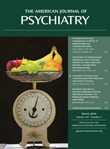Normalizing Effects of Modafinil on Cocaine-Induced Sleep Abnormalities
In this issue of the Journal, Peter T. Morgan, M.D., Ph.D., and colleagues (1) report that modafinil reversed polysomnographic abnormalities in cocaine-dependent patients (N=20) during a 3-week period of supervised abstinence on an inpatient unit. All subjects tested positive for cocaine on admission and were randomly assigned to modafinil (400 mg/day) or placebo in this double-blind study. Despite the widely held view that sleep disturbances during cocaine withdrawal last only a few days, polysomnographic findings demonstrated a progressive worsening of sleep abnormalities at night as well as daytime sleepiness in placebo-treated cocaine-dependent subjects relative to a group of healthy comparison subjects (N=12). Modafinil treatment improved the latency, duration, and architecture of nighttime sleep and also reduced daytime sleepiness in the study participants. It is noteworthy that slow-wave sleep duration was dramatically normalized and found to be twice as long in the modafinil group (N=10) compared with the placebo group (N=10). These findings are interesting in light of the fact that modafinil is under current investigation as a treatment for cocaine dependence. The authors suggest that sleep disturbances associated with cocaine withdrawal are more than symptomatic consequences of the illness and may provide a "novel target" for testing medicinal therapy. Their implication is that agents capable of reversing polysomnographic abnormalities might improve clinical outcome in cocaine-dependent patients.
The importance of the authors' findings hinges on the clinical relevance of the polysomnographic abnormalities that they identified in the cocaine-dependent patients. Do these abnormalities affect important clinical phenomena of the disease, such as euphoria, craving, denial, and hedonic dysregulation (2)? The authors suggest that normalization by an agent like modafinil might actually improve clinical outcome. They cite two references to support this statement (3, 4), which essentially report that normal volunteers are more likely to choose methylphenidate when they are sleepy, suggesting that stimulant reward is enhanced by sleepiness. Along these lines and more to the point, Sofuoglu and colleagues (5) conducted a controlled human laboratory study showing that cocaine users in the state of withdrawal (which includes hypersomnia) reported enhanced euphoria after they smoked a single dose of cocaine. These human laboratory findings suggest that sleepiness might amplify stimulant-induced euphoria, which reinforces stimulant use, but do not specifically demonstrate that sleep deficits "could increase the likelihood for relapse," as stated by Morgan and colleagues (1). Modafinil has been reported to blunt cocaine-induced euphoria in three controlled human laboratory studies (6–8), but positive findings in clinical trials are necessary to establish efficacy.
There is another problem with the authors' contention that agents capable of normalizing cocaine withdrawal sleep abnormalities might be clinically advantageous in the treatment of cocaine dependence. They previously reported that cocaine itself reverses sleep abnormalities associated with cocaine dependence (9), including increased slow-wave sleep activity during the night following cocaine administration and "rebounds in REM sleep and total sleep that develop the next day" (1).
Cocaine reverses sleep abnormalities associated with cocaine withdrawal, but it is not a treatment for cocaine dependence. Therefore, to suggest that modafinil might improve treatment outcome, based on its ability to normalize sleep abnormalities, is premature.
These caveats aside, we are nonetheless intrigued by the persistence of sleep abnormalities during cocaine withdrawal and their dramatic normalization with modafinil treatment. We have long advocated normalizing cocaine-induced neuroadaptations as a pharmacological strategy for cocaine dependence (10), and our initial decision to investigate this agent was based in part on normalizing cocaine-induced dysregulation of glutamate and dopamine function (11). We also note that controlled trials of modafinil have reported an increase in the rate and duration of cocaine abstinence (12, 13) and a reduction in craving (13). This study identifies another interesting effect of modafinil on cocaine dependence, suggesting that polysomnography might provide a useful biological marker to assess addiction severity and treatment response to pharmacological agents that are desperately needed to treat this tenacious illness.
The relationship between persistent sleep disturbances and relapse to addiction warrants further investigation. Our recent report that quetiapine improves abstinence and sleep disturbances in alcohol-dependent patients (14) raises the question of whether these two outcomes are related. Might sleep disruptions mirror important clinical phenomena of cocaine dependence and thus perpetuate continued use? This question remains unanswered and is well worth exploring.
1 : Normalizing effects of modafinil on sleep in chronic cocaine users. Am J Psychiatry 2010; 167:331–340 Link, Google Scholar
2 : Cocaine dependence: a disease of the brain's reward centers. J Subst Abuse Treat 2001; 21:111–117 Crossref, Medline, Google Scholar
3 : Sleepiness and the reinforcing and subjective effects of methylphenidate. Exp Clin Psychopharmacol 1999; 17:145–150 Crossref, Google Scholar
4 : Reinforcing and subjective effects of methylphenidate: dose and time in bed. Exp Clin Psychopharmacol 2004; 12:180–189 Crossref, Medline, Google Scholar
5 : Association of cocaine withdrawal symptoms with more severe dependence and enhanced subjective response to cocaine. Drug Alcohol Depend 2003; 69:273–282 Crossref, Medline, Google Scholar
6 : Modafinil and cocaine: a double-blind, placebo-controlled drug interaction study. Drug Alcohol Depend 2003; 70:29–37 Crossref, Medline, Google Scholar
7 : Smoked cocaine self-administration is decreased by modafinil. Neuropsychopharmacology 2008; 33:761–768 Crossref, Medline, Google Scholar
8 : Modafinil and cocaine interactions. Am J Drug Alcohol Abuse 2006; 32:577–587 Crossref, Medline, Google Scholar
9 : Sleep architecture, cocaine and visual learning. Addiction 2008; 103:1344–1352 Crossref, Medline, Google Scholar
10 : Cocaine dependence: the challenge for pharmacotherapy. Curr Opin Psychiatry 2002; 15:261–268 Crossref, Google Scholar
11 : Glutamatergic agents for cocaine dependence. Ann N Y Acad Sci 2003; 1003:328–345 Crossref, Medline, Google Scholar
12 : A double-blind, placebo-controlled trial of modafinil for cocaine dependence. Neuropsychopharmacology 2005; 30:205–211 Crossref, Medline, Google Scholar
13 : Modafinil for the treatment of cocaine dependence. Drug Alcohol Depend 2009; 104:133–139 Crossref, Medline, Google Scholar
14 : A double-blind, placebo-controlled pilot trial of quetiapine for the treatment of type A and type B alcoholism. J Clin Psychopharmacol 2007; 27:344–351 Crossref, Medline, Google Scholar



